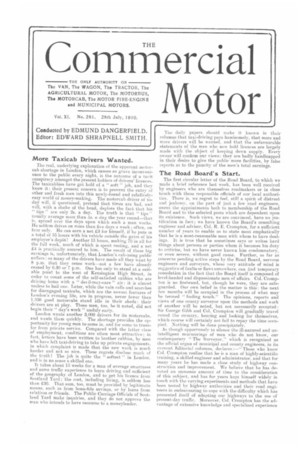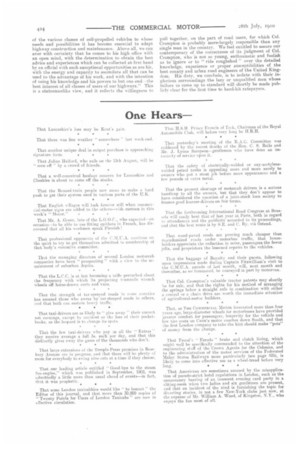More Taxicab Drivers Wanted.
Page 1

Page 2

If you've noticed an error in this article please click here to report it so we can fix it.
The real, underlying explanation F the apparent nintorcab shortage in Landon, which causes so grave inconvenience to the public every night, is the outcome of a tacit conspiracy amongst the present holders of drivers' licences. The taxicabbies have got hold of a " soft" job, and they know it : their present concern is to prevent the entry of other and fresh men into this newly-found and relativelyeasy world a money-making. The motorcab driver of today will, if questioned, pretend that times are bad, and will, with a shake of the head, deplore the fact that his " tips " are only 2s. a day. The truth is that " tips " usually average more than 5s. a day the year round—that is, spread over the days upon which such a man works. He seldom drives on more than five days a week ; often, on four only. He can earn a net 1;3 for himself, if he puts in a total of 55 hours with his vehicle outside the gates of his employer's depot! Another 15 hours, making 70 in all for the full week, much of which is spent resting, and a net
is practically assured to him. The result of these big earnings is, unfortunately, that London's cab-using public suffers: so many of the drivers have made all they want by 8 p.m. that they cease work—not a few have already ceased by 6.30 or 7 p.m. One has only to stand at a suitable point to the west of Kensington High Street, in order to count some of the self-satisfied cabbies who are driving home with a " devil-may-care " air : it is almost useless to hail one. Later, while the vain calls and searches for disengaged taxicabs, which are the newest features of T.ondon's evening life, are in progress, never fewer than 1,500 good motorca,bs stand idle in their sheds: their drivers are at play. These men, too, be it noted, did not begin their " day's work" unduly early.
London wants another 3,000 drivers for its motorcabs, and wants them quickly. The shortage provides the opportunity for young men to come in, and for some to transfer from private service. Compared with the latter class of employment, conditions are often most attractive ; in fact, letters have been written to brother cabbies, by men who have left taxi-driving to take up private engagements, in which complaint is made that the new work is much harder and not so nice. These regrets disclose much of the truth I The job is quite the " softest " in London. and is in no sense a skilled one.
It takes about 15 weeks for a man of average smartness and some traffic experience to learn driving and sufficient of the geography of London, and to get his licence from Scotland Yard ; the cost, including living, is seldom less, than i:30. That sum, too, must be provided by legitimate means, such as from bona-fide savings, or by loans from relatives or friends. The Public Carriage Officials of Scotland Yard make inquiries, and they do not approve the man who intends to have recourse to a moneylender.
The daily papers should make it known in their. columns that taxi-driving pays handsomely, that more and more drivers will be wanted, and that the unfavourable statements of the men who now hold lieences are largely made with the object of keeping down supply. Every owner will confirm our views : they are badly handicapped in their desire to give the public more facilities, by false reports as to the paucity of the men's total earnings.
The Road Board' s Start.
The first circular letter of the Road Board, to which we made a brief reference last week, has been well received by engineers who are themselves roadmakers or in close touch with those responsible officials of our local authorities. There is, we regret to feel, still a spirit of distrust and jealousy, on the part of just a few road engineers, anent the appointments both to membership of the Road Board and to the salaried posts which are dependent upon its existence. Such views, we are convinced, have no justifieation in fact; we have known the Board's consulting engineer and adviser, Col. R. E. Crompton, for a sufficient number of years to enable us to state most emphatically that he is a most-reasonable man with whom to have dealings. It is true that he sometimes says or writes hard things about persons or parties whom it becomes his duty to criticise, but we have never known him condemnatory, or even severe, without good cause. Further, so far as concerns pending active steps by the Road Board, nervous engineers and surveyors, whose very attitude of mind is suggestive of faults or flaws somewhere, can find temporary consolation in the fact that the Board itself is composed of level-headed and dispassionate men of affairs. Col. Crompton is no firebrand, but, though he were, they are safeguarded. Our own belief in the matter is this : the next few months will be occupied in the process of what may termed " finding touch." The opinions, reports and views of one county surveyor upon the methods and work of another will be noted, but, not. necessarily accepted : Sir George Cibb and Col. Crompton will gradually travel round the country, hearing and looking for themselves, which course will certainly not fail to repay the time occupied. Nothing will be done precipitately.
As though opportunely to silence the ill-natured and unintelligent murmurings of men who do not know, our contemporary " The Surveyor," which is recognized as the official organ of municipal and county engineers, in itscurrent Editorial columns, declares :—" Those who know Col. Crompton realize that he is aman of highly-scientific training, a skilled engineer and administrator, and that for many years he has made a close study of highway construction and improvement. We believe that he has devoted an immense amount of time to the consideration of this subject, and has for years kept himself widely in touch with the varying experiments and methods that have been tested by highway authorities and their road engineers in endeavouring to cope with the difficulty which has presented itself of adapting our highways to the use of present-day traffic. Moreover, Col. Crompton has the advantage of extensive knowledge and specialized experience of the various classes of self-propelled vehicles to whose needs and possibilities it has become essential to adapt highway construction and mainteuance. Above all, we can aver with certainty that he comes to his high office with an open mind, with the determination to obtain the best advice and experiences which can be collected at first hand by an official with such exceptional opportunities as are his, with the energy and capacity to assimilate all that can be used to the advantage of his work, and with the intention of using his knowledge and his powers to but one ends—the best interest of all classes of users of our highways!' This is a statesmanlike view, and it reflects the willingness to
pull together, on the part of road users, for which Col. Crompton is probably more-largely responsible than any single man in the country. We feel entitled to assure our contemporary of the correctness of its judgment of Col. Crompton, who is not so young, enthusiastic and foolish as to ignore or to " ride roughshod " over the detailed knowledge, experience or proper susceptibilities of the hest county and urban road engineers of the United Kingdom. His duty, we conclude, is to isolate with their inglorious surroundings the lazy or unqualified men whose failure to come up to standard will shortly be made publicly clear for the first time to hard-hit ratepayers.




















